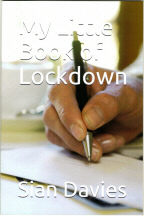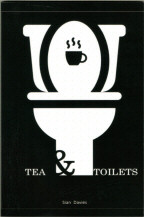 The Judge
RAVES!
The Judge
RAVES!
Date: 02/12/20
Three For Your Tree
(Or, Lock Down, Sit Down and Chow Down)



It is rare for a reviewer to get an opportunity to recommend three books at once. It is rarer still for those books to come from the same writer. It is practically unheard of for that author to be a new voice in print. But such is my privilege in drawing your attention to the three slim (or positively anorectic) volumes illustrated above.
It is at this point that I must in all conscience declare an interest. Siān Davies has been a valued and vital friend for nearly thirty years, starting from when we joined the Depratment on the same day in February 1991. What follows - sarky remarks and all - has been in no way shaped by envy of the fact that she has got herself into print with actual books before I have, oh deary me, no.
With her retirement from Her Majesty's Revenge and Custard looming (and, with a pleasing book-end symmetry, on the same day as me), with a lot of time on her hands given that circumstances were preventing her from indulging in her customary mad social whirl, and with her desire to brighten somebody's day, Siān's first venture into print, My Little Book Of Lockdown was published in June of 2020. In its mere 29 pages, the author takes us on a little tour of comments and reminiscences to bring amusement to those in need of it, taking in such matters of great moment as her tourist (mis)adventures, the perils of being a wedding accessory, the embarrassment caused by flighty parents, and more.
The tone is - and properly so in the context - light throughout, and although I am in possession of privileged information in this regard, I can nonetheless confidently state that the authentic Voice of the Author is heard; in fact, I have a virtual audiobook playing in my head as I read about how smiling with one's lips closed utterly unnerves people, the history of the Military Two-Step and how it should never be given the time of day in high-street chemists, and many other such aperēus. The minutes (and it is, alas, only minutes, due to the low page-count) pass most agreeably.
Well, if Siān Davies didn't then go and publish another book practically the next day! Tea & Toilets ("One woman's never ending quest for the perfect loo and a brew") is in every sense a more substantial book, running (if that's not an inappropriate verb in the context) to a considerable 91 pages, in which Our Heroine begins every chapter with the words, "In which our heroine...". (This is not a catty comment by the reviewer, by the way; well, it is, but I reckon I can just about get away with it; it merely reflects the episodic way in which the book is written and presented).
The author takes us on a roller-coaster ride (and you would almost certainly need both of the subjects discussed in the book after one of those, and not necessarily always in the same order) through her pursuit of the platonic tea and the equally above-bog-standard conveniences which she has made her life-long goal...not to say obsession.
In this tour d'horizon, she leads us from her childhood experiences of both - as it were - the inputs and the outputs (including the longing for beverages far more exciting than PG Tips, but which were to her strengstens verboten, such as Fanta, and the perils of simply accessing the lavs in the town's cinemas), on to her school, college and uni years. We then follow her through her encounters with both posh tea and posh loos (and I can vouch for at least one statement; even the gents at the Grosvenor in Pulford are of a high standard).
Interspersed with her experiences and expectations on both sides of the equation in work situations (which includes the essentials of mug protection and hygiene) are a series of travelogues which start with Our Heroine's encounters with festival and canal-boat 'facilities' (including a hint on how to extract someone from a portaloo suffering from a jammed lock), before expanding firstly to Europe (there are - or were, at least in the early 1990s - only two ladies' in the Palace of Versailles, a fact which I'm sure now features in the more comprehensive guidebooks); to Tunisia and on to the do's and don'ts of visiting India and China (in brief: India, do, China don't - under any circumstances). The author then rounds off with some general information of historical import regarding both tea and toilets (some of which didn't make the final edit of this book, but can be found as a chapter all to itself in My Little Book Of Lockdown above).
(I have to enter a strong Public Service Warning at this point: do not read Chapter 21 if you are, a) eating, b) about to eat, or c) have recently eaten (where 'recently' may be defined as 'any time in the last three days'). I would query the wisdom of including that anecdote at all, but if the author wishes to give us so much of herself, then that is her inalienable right).
At this point, I have to confess a difficulty. Although the subjects of this book constitute - both individually and in combination - somewhat of a niche interest generally, they are even more so for me. My experiences with tea were forever clouded by having cold, sweet tea in my bottle at night as an infant and - apart from three weeks in the early Spring of 1984 in the one part of Conamara where they had never seemingly heard of coffee, and so gave me no option but to drink the stuff - I have been able to steer gratefully clear of it ever since. Similarly, I have long had a more than normal dread of public lavatories of all forms, and have to be absolutely desperate before I will use one. This means that I am far from being the best-qualified to judge the substance of Tea & Toilets.
I do feel that I can reasonably assess the style of the work, however. Siān Davies' style is matter-of-fact but far from dry. As with ...Lockdown, the leavening of humour and the ability to describe her experiences in ways which make you feel that you were there (wherever it was) with her - whether you might want to be or not - makes the book eminently readable, even if your own engagement with either of the two subjects of the book is, like mine, marginal.
(And the fact that the front cover looks - if you take your glasses off, or if you close your eyes somewhat and squint - a lot like Mr Yonghy-Bonghy Bo being sucked down the pan gives an additional piquancy to the experience).
Having paused to draw breath, and with several further lockdowns either in progress or pending, last month Siān Davies brought us her festive offering, The Ghosts Of Christmases Past.
Now, as someone who has long been largely indifferent to The Season of Good Swill, I wasn't sure how I would react to this forty-odd-page paean to the Appropriated Solstice.
Reader, I loved it. I think that you may well do too.
Part of the reason is because we are of similar ages, and grew up within a few miles of each other; me, a working-class boy in an industrial village in the hills above our throbbing local metropolis (and I would remind you that things that throb are usually things which cause pain), raised as in effect an only child; her, the child of a middle-class family in the suburbs and with a kid brother to boot (which is often the best thing to do to kid brothers, I'm told).
So many of Siān's experiences - at least in childhood, which is the common heritage of us all - reflect my own, be it the school carol service (hers in the mighty St Giles' in town, mine in the smaller, squatter and undoubtedly colder St Mary's five miles and five hundred feet of elevation away); or the eager scanning - rather like truffle-hunting pigs - of the Christmas and New Year editions of the Radio Times and TV Times in search of the Must-See Viewing and Listening Experience (when I started doing that in about 1975, the list covered nearly two sides of A4 in my smallest writing; by the time 1985 rolled around, I could have written it majuscule on a postage stamp); or the list of drinks permitted to one once in the transition from childhood to adolescence (we had port and lemonade in common, but her Cherry B was my Emva Cream).
But there is another - more general and more widely-appreciable - reason why this book is captivating, and that is in the author's tone. Such a book celebrating the most iconic of our society's feast-days could easily have lapsed into outright gooeyness, but is saved by Siān Davies' gently direct style. Yes, of course there is sentimentality here; how could there not be given the subject? But it is leavened by a deft lightness of touch, as in when she provides a two-word description of snowball (the drink, not the meterological phenomenon; even less so the pig) which is frighteningly apt, or when she relates to us the appalling fate of Pippa the doll.
All in all, this is a book to bring a comforting yet mirthful light into the darkest part of the year, and is even more valuable in so doing this year than in most.
All of these books are available in both digital and forest-felling formats from Amoralzone by clicking on the links above (in either the text or in the cover illustrations).



 The Judge
RAVES!
The Judge
RAVES!


